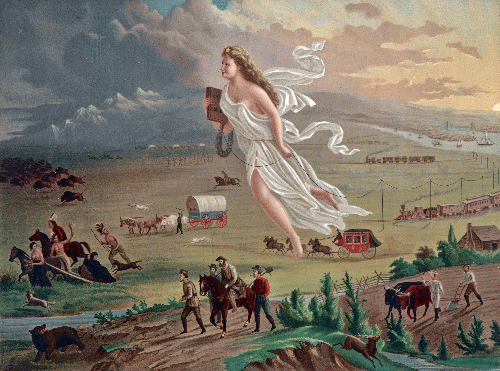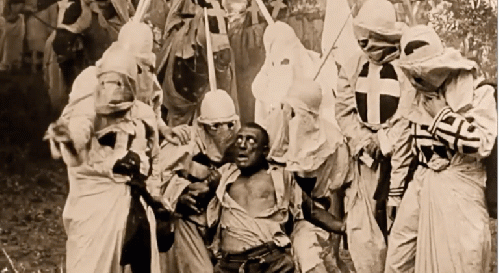
American Progress (John Gast painting)
(Image by (Not Known) Wikipedia, Author: Author Not Given) Details Source DMCA
Roberto Sirvent and Danny Haiphong have explored the albatross of myths, legends, lies and damn lies around America's neck in their book American Exceptionalism and American Innocence: A People's History of Fake News From the Revolutionary War to the War on Terror. They look into America's closet of historical secrets and expose them. They knock down the stuff that is just made up. The authors explain why the US habitually denies its own bad behavior, and projects it onto others.
Over the centuries the US has developed an illusion of grandeur. It imagines itself as indispensable and exceptional, unlike any nation that has ever existed. Exceptionalism means not having to say you are sorry or pay for your mistakes. Being exceptional means you are the law. You are the policeman, the judge, the jury and the executioner.
To enforce its exceptionalism the US has built a mighty military. The price for its grandiose military has been the neglect of the American people. The US is addicted to militarism and violence. From its founding the US was a violent country. It used violence to acquire and occupy the land, and to gain independence from Great Britain. The US maintained that God was on its side, and it was innocence of any wrongdoing. The US just made it up that it was Manifest Destiny that it should become an empire. Americans saw themselves as being on a civilizing mission for God.
The Myth of Manifest Destiny
Movies glorifying and romanticizing the westward expansion of the US were an early theme of motion pictures. One of the first silent movies was a Western produced in 1903: "The Great Train Robbery". Right from the beginning motion pictures created false narratives and myths.
Manifest Destiny was an expression of white supremacy. A 1915 silent move spectacle was The Birth of a Nation, which falsely recasts the Civil War and the Reconstruction Era. It portrays the South as a victim, depicts blacks as depraved, and the Ku Klux Klan as a heroic white protector of America's virginity. After featuring the movie in the White House, President Woodrow Wilson said:
"It is like writing history with lightning. And my only regret is that it is all so terribly true."
Hollywood perpetuates America's spirit of exceptionalism, often in cahoots with the power elites of the ruling class. Up until the late 1960's Western movies were a regular theme, which was later adapted to television too. Movies, radio and television were revolutionary forms of entertainment, information, advertising, and propaganda in the 20th century.
When I was growing up in the 1950's playing "cowboys and Indians" was a favorite pastime for children. We reenacted what we saw in the movies. For example, watch the below movie trailer for "How the West Was Won", produced in 1963:
[How the West Was Won Fake History]
The phrase Manifest Destiny was not coined until the mid-19th century. But the ideology had started with the colonial settlement and ethnic cleansing of the indigenous people. As Sirvent and Haiphong explain:
"George Washington and his secretary of war Henry Knox wasted no time in laying the basis for Manifest Destiny. Manifest Destiny was an alteration to the colonial ideology that led to the formation of the American nation-state"..Manifest Destiny presupposed that American expansion from coast to coast was a matter of ordained fate justified by the Republic's superior civilization".
During the westward expansion the phrase Manifest Destiny came into vogue with the debate about whether or not to steal one-third of Mexico, while "taming" the West. Manifest Destiny won the debate.
The westward expansion of the US empire did not stop at the shore of the Pacific Ocean. It kept on going to Asia. The US became a colonial empire, and went knocking down the trade barriers of Japan, Korea and China. The US believed in "free trade", even if it had to be at the point of a gunboat.
(Note: You can view every article as one long page if you sign up as an Advocate Member, or higher).






